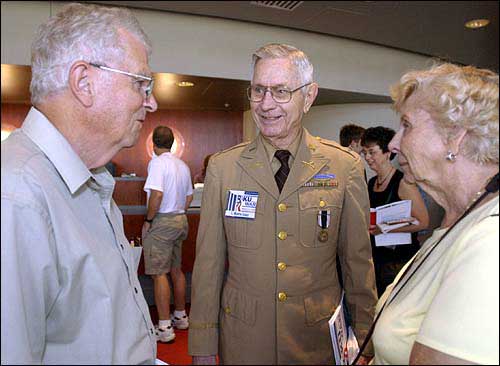Uniform fits fine 58 years later
WWII second lieutenant shows up in military dress at Lied Center
Martin Jones said the last time he wore his Army uniform “seriously” was 58 years ago, when he was discharged.
He wore it again Sunday.
“I was commissioned a second lieutenant in the (U.S. Army) infantry in June of 1944,” Jones said Sunday, surrounded by admirers in the Lied Center lobby after he had joined a group of veterans seated on stage for the panel discussion, “KU Goes to War.”
“Officers, of course, buy their own uniforms. So I bought this 59 years ago last month,” he said.
Asked how he’d manage to maintain a steady waistline all those years, Jones laughed and looked at his wife, Phyllis. “She feeds me well and wisely,” he said.
Jones, 80, of Lawrence, was captured during the Battle of the Bulge and spent four-and-a-half months in prisoner-of-war camps.
“By the time I was captured, the Allies were at the German border and had complete control of the air,” he said. “That meant there was almost nothing for us to eat. I lost 35 pounds in three months.”
Ogden Lindsley, Lawrence, also wore his uniform to the Dole Institute of Politics dedication event.
Lindsley, a former KU professor of special education, was shot down in the mountains of Albania in 1944 and spent the next 10 months in German captivity.

With his 59-year-old U.S. Army uniform still intact and his physique the right size to wear it, Martin Jones, center, talks with Stan Shumway, a retired music professor at Kansas University, left, as Jones' wife, Phyllis, right, listens. The three had attended Sunday's KU
With Allied forces closing in, the Germans moved the POWs around. He escaped from a forced march and found a group of British tankers advancing on the Germans. They told him to stay on the road because the forest was “full of Germans.”
“I didn’t do much in the war, but I’m proud of what I did,” he said.
Jones, a retired KU professor of business, said he was grateful for the recognition being shown to World War II veterans. But it’s unfortunate, he said, that veterans of subsequent wars weren’t similarly feted.
“Every time I come to one of these celebrations, I think, ‘Surely, this is the last of it; it’s time to move on,’ and then another one comes along,” he said. “I appreciate them, I think they’re great, but I feel sorry for the Vietnam veterans who didn’t get the reaction I got when I came home — and who don’t get celebrations like this one.”


 Video reports
Video reports




